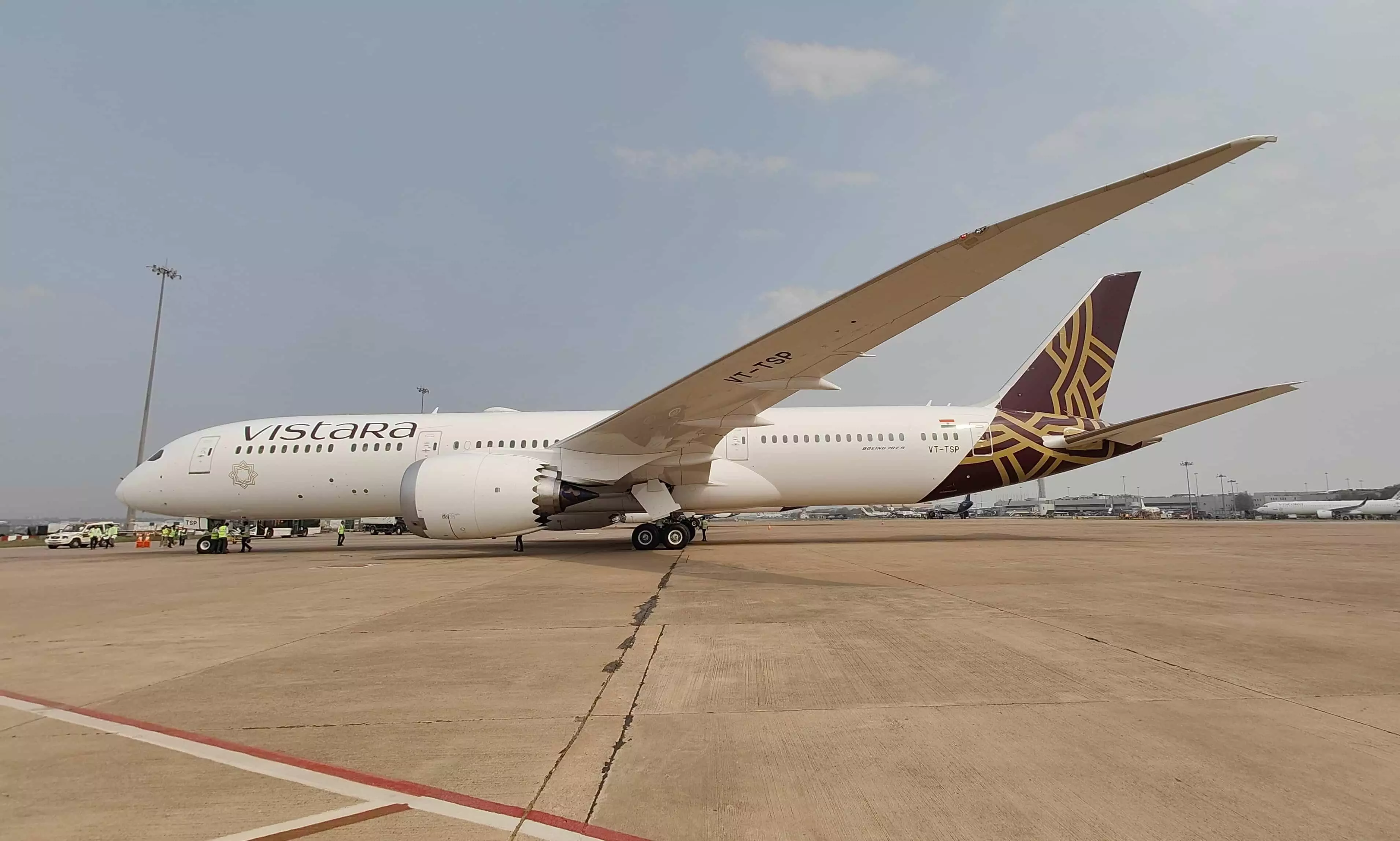
Vistara first Indian airline to operate wide-body aircraft on long haul using SAF
The special flight, using SAF, was operated on Vistara’ s brand-new Boeing 787-9 Dreamliner in partnership with Boeing and GE Aerospace.

Vistara, the Indian full-service carrier and a joint venture of Tata group and Singapore Airlines, became India’s first carrier to operate a wide-body aircraft using sustainable aviation fuel (SAF) on a long-haul route.
The ferry flight from Charleston International Airport, South Carolina to Indira Gandhi International Airport, Delhi was operated in partnership with The Boeing Company and GE Aerospace, on Vistara’ s newest GEnx-powered Boeing 787-9 Dreamliner aircraft, the fourth in its fleet. By using a blend of 30 percent SAF with 70 percent conventional jet fuel, Vistara was able to reduce approximately 150,000 pounds of CO₂ emissions over the fuel’s life cycle.
Vinod Kannan, chief executive officer, Vistara, said, “We take immense pride in carrying out another pioneering initiative to operate a wide-body aircraft on a long-haul route using SAF, as we took delivery of our all-new Boeing 787-9 Dreamliner. This is an important milestone in our commitment towards achieving carbon neutrality. We thank our partners, Boeing and GE Aerospace, for their support and hope that initiatives such as this, open up more avenues for the industry to increasingly adopt sustainable technologies. Since the very beginning, Vistara had decided to invest in modern and advanced new aircraft with fuel efficient engines, and we remain committed towards reducing carbon emissions across all areas of our operations.”
Salil Gupte, president, Boeing India said, “We congratulate Vistara on the significant achievement of becoming the first Indian airline to operate a wide-body aircraft, the Boeing 787-9, on a long-haul route using SAF. This is a major milestone in the Indian aviation industry's journey towards decarbonization, and we are proud to have been a partner in this endeavour. Boeing remains committed to working with Vistara and other partners to promote the use of SAF in the Indian aviation industry and around the world, in support of our collective goal of achieving a sustainable future for air travel.”
Vikram Rai, country head – South Asia & Indonesia, GE Aerospace said, “GE Aerospace congratulates Vistara on this milestone. The GEnx engine, like all GE Aerospace engines, can operate on approved SAF blends today. Compatibility with existing aircraft engines is one of the reasons SAF is critical to helping the aviation industry reach its goal to be net zero by 2050 and collaborations like this encouraging greater adoption of SAF globally helps bring us closer to this target. The GEnx is also up to 15% more fuel efficient than its predecessor, helping reduce fuel consumption and CO2 emissions in flight in addition to the benefits of SAF.”
The GEnx engine is a high-thrust jet engine developed for the 787 Dreamliner and 747-8 airplane. Compared to its predecessor the CF6, the GEnx engine is up to 15 percent more fuel efficient with up to 15 percent fewer CO2 emissions. Representing a giant leap forward in propulsion technology, GEnx uses lightweight durable materials and advanced design processes to reduce weight, improve performance, and lower maintenance, making it the best engine choice for many long-haul flights.
“GE Aerospace is committed to helping our customers reduce emissions with advanced, more efficient propulsion technologies like the GEnx engine. Collaborations like this, that bring a long-haul flight using SAF for the first time to India, show what solutions are possible on a global scale towards the aviation industry’s net zero ambitions,” said Dave Kircher, general manager of the GEnx engine program for GE Aerospace.
Sustainable Aviation Fuel (SAF) is a cleaner and more sustainable alternative to conventional jet fuel, lowering carbon emissions by up to 80% over the fuel’s life cycle, depending on the feedstock. Vistara is constantly looking at improved ways to do business, keeping sustainability at the heart of those innovations and this ferry flight on SAF, another industry first initiative in India, is a testament to that.
The airline is currently working under the TATA Aviation Sustainability Working Group along with the other aviation arms of the TATA group for reducing carbon emissions. Vistara, along with other airline companies of the Tata group – Air India and Air Asia India, recently signed an MoU with the Council of Scientific and Industrial Research – Indian Institute of Petroleum to collaborate on the research, development and deployment of sustainable aviation fuels (SAFs). The airline would also be jointly working through the Carbon Offsetting and Reduction Scheme for International Aviation (CORSIA), to lower CO2 emissions for international flights and to curb the industry’s impact on climate change.

